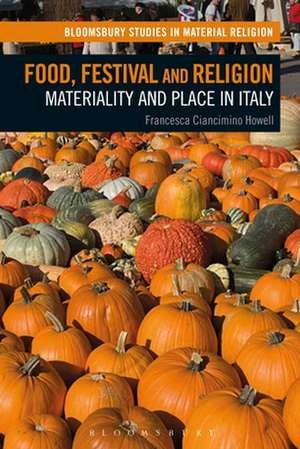Food, Festival and Religion: Materiality and Place in Italy: Bloomsbury Studies in Material Religion
Autor Francesca Ciancimino Howellen Limba Engleză Paperback – 19 feb 2020
| Toate formatele și edițiile | Preț | Express |
|---|---|---|
| Paperback (1) | 223.67 lei 6-8 săpt. | |
| Bloomsbury Publishing – 19 feb 2020 | 223.67 lei 6-8 săpt. | |
| Hardback (1) | 714.77 lei 6-8 săpt. | |
| Bloomsbury Publishing – 8 aug 2018 | 714.77 lei 6-8 săpt. |
Preț: 223.67 lei
Preț vechi: 288.32 lei
-22% Nou
Puncte Express: 336
Preț estimativ în valută:
42.80€ • 45.77$ • 35.69£
42.80€ • 45.77$ • 35.69£
Carte tipărită la comandă
Livrare economică 17 aprilie-01 mai
Preluare comenzi: 021 569.72.76
Specificații
ISBN-13: 9781350150867
ISBN-10: 135015086X
Pagini: 224
Ilustrații: 10 bw illus
Dimensiuni: 156 x 234 mm
Greutate: 0.32 kg
Editura: Bloomsbury Publishing
Colecția Bloomsbury Academic
Seria Bloomsbury Studies in Material Religion
Locul publicării:London, United Kingdom
ISBN-10: 135015086X
Pagini: 224
Ilustrații: 10 bw illus
Dimensiuni: 156 x 234 mm
Greutate: 0.32 kg
Editura: Bloomsbury Publishing
Colecția Bloomsbury Academic
Seria Bloomsbury Studies in Material Religion
Locul publicării:London, United Kingdom
Caracteristici
Interweaves
Christian,
Pagan
and
witchcraft
history
and
engages
with
lived
religion
and
archaeological
rock-art
sites
Notă biografică
Francesca
Ciancimino
Howellis
Adjunct
Faculty
in
Resilient/Environmental
Leadership
at
Naropa
University,
Colorado,
USA
Cuprins
List
of
Images
Acknowledgements
Preface
1.
Materiality,
things
and
power
2.
The
Phenomenon
of
the
Community
Festival
3.
Community,
tradition
and
festivals
in
Lombardy
4.
Community,
tradition,
food
and
festival
in
Piedmont
5.
Feasting
and
living
Paganism
in
Northern
Italy
6.
Theoretical
foundations
and
diverse
perspectives
7.
Analyses
and
Conclusions
Conclusion
References
Index
Recenzii
Provides
rich
ethnographic
detail
on
some
of
Italy's
fascinating
community
festivals
and
gatherings.
Howell's
scale
of
engagement
may
provide
other
researchers
with
a
tool
on
which
to
build
a
comparative
body
of
information
on
such
events,
not
only
in
other
regions
of
Italy
but
in
other
parts
of
the
world.
I
enjoyed
reading
this
book
and
recommend
it
for
courses
in
ritual
and
religion
as
well
as
to
the
more
general
reader.
I believe this work has the potential to be something major. In my opinion and from my experience in the overall field, this book constitutes a real treasure and is something not to be missed. It is infused with the same gentle warmth and informative freshness that is Francesca Howell herself.
The book draws on fascinating field data and engages with ideas that are pertinent and current. It provides unique insights into the North Italian context with regard to the themes it addresses.
Festivals and foods not only take place but make places. They not only arise from religions and cultures but shape and flavour them. Attention to the materiality of places, foods and festivity - and to interacting bodies - greatly improves our understanding of religion as it is lived in ritual and everyday contexts.Food, Festival and Religionoffers a feast to be savoured as the study of material religion gains ground.
This innovative ethnography examines the links between local festivals, religious materiality, and the ways communities construct a sense of place in northern Italy. By examining both mainstream political festival organization and that of alternative new religions such as Druidry, it paints a vivid picture of how groups link heritage and identity using discourse, symbols, and enactments. Critical to anyone wishing to understand the complex relationships between globalization, localization, and the emergence of blood-and-soil nationalisms in Europe.
Food, Festival and Religionis a well-researched, captivating, beautifully written, and ethnographically sound book. It is the result of a decade of research and it convincingly makes a case for addressing festivals and food festivals as evidences of the 'relational epistemology' connecting human and other-than-human actors. Accessible to multiple readers without losing in complexity and sophistication, it could be of interest to students and scholars of religion, festival studies, environmental studies, social sciences and Italian studies.
I believe this work has the potential to be something major. In my opinion and from my experience in the overall field, this book constitutes a real treasure and is something not to be missed. It is infused with the same gentle warmth and informative freshness that is Francesca Howell herself.
The book draws on fascinating field data and engages with ideas that are pertinent and current. It provides unique insights into the North Italian context with regard to the themes it addresses.
Festivals and foods not only take place but make places. They not only arise from religions and cultures but shape and flavour them. Attention to the materiality of places, foods and festivity - and to interacting bodies - greatly improves our understanding of religion as it is lived in ritual and everyday contexts.Food, Festival and Religionoffers a feast to be savoured as the study of material religion gains ground.
This innovative ethnography examines the links between local festivals, religious materiality, and the ways communities construct a sense of place in northern Italy. By examining both mainstream political festival organization and that of alternative new religions such as Druidry, it paints a vivid picture of how groups link heritage and identity using discourse, symbols, and enactments. Critical to anyone wishing to understand the complex relationships between globalization, localization, and the emergence of blood-and-soil nationalisms in Europe.
Food, Festival and Religionis a well-researched, captivating, beautifully written, and ethnographically sound book. It is the result of a decade of research and it convincingly makes a case for addressing festivals and food festivals as evidences of the 'relational epistemology' connecting human and other-than-human actors. Accessible to multiple readers without losing in complexity and sophistication, it could be of interest to students and scholars of religion, festival studies, environmental studies, social sciences and Italian studies.














